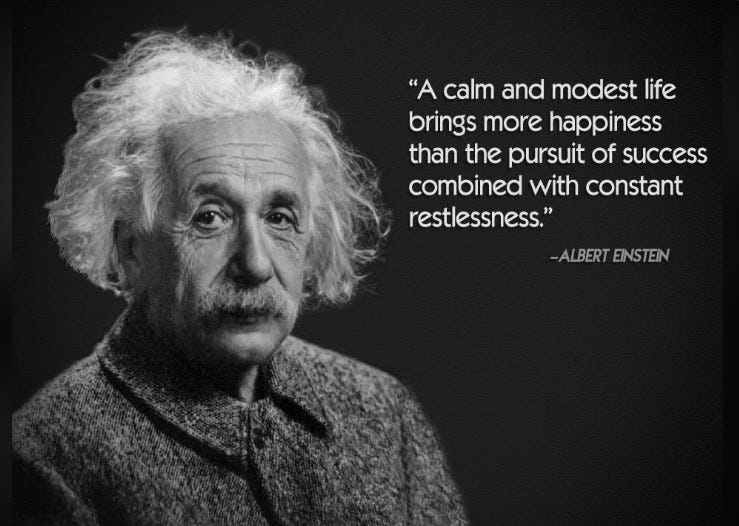Einstein's Formula for Happiness
A Lesson in Balance
“Everyone chases after happiness, not noticing that happiness is right at their heels.”
–Bertolt Brecht
Einstein’s Formula for Happiness
If you enjoy each Sunday’s message, please pass it along. July’s goal is to double our Chasing Influence subscribers. Thank you for your help and support in sharing with one new reader!
Chasing Influence: Transformational Coaching to Build Champions for Life
In 1922, a man with distinctively wild white hair found himself in a Tokyo hotel, having just won the Nobel Prize in Physics. Short on change to tip the bellboy delivering a message, Albert Einstein handed the hotel courier some signed, handwritten notes instead. "Save these notes," he told the hotel worker, "they might be valuable in the future."
One of these notes would later become famous for its profound reflection on happiness: "A calm and modest life brings more happiness than the pursuit of success combined with constant restlessness."
Could Einstein have solved yet another of life’s most difficult questions? His wisdom reminds us of the age-old story of the fisherman on the beach, which perfectly illustrates this philosophy.
One day, a fisherman relaxed on a beautiful beach, with his fishing pole propped up in the sand and his solitary line cast out into the sparkling blue waters. He enjoyed the warmth of the afternoon sun and the prospect of catching a fish.
A businessman, seeking relief from the stress of his workday, noticed the fisherman and decided to find out why he was fishing instead of working harder to make a better living for himself and his family. “You aren’t going to catch many fish that way,” said the businessman. “You should be working rather than lying around on the beach!”
The fisherman looked up, smiled, and replied, “And what will my reward be?”
“Well, you can get bigger nets and catch more fish!” said the businessman.
“And then what will my reward be?” asked the fisherman, still smiling.
“You will make money and you’ll be able to buy a boat, which will then result in even more fish!” answered the businessman.
“And then what will my reward be?” the fisherman repeated.
The businessman, now irritated, said, “You can buy a bigger boat, hire a crew to work for you, and catch even more fish!”
“And then what will my reward be?” the fisherman asked again.
The businessman, now angry, exclaimed, “Don’t you understand? You can build up a fleet of fishing boats, sail all over the world, and let your employees catch fish for you!”
“And then what will my reward be?” persisted the fisherman.
The businessman, red with rage, had reached his boiling point and couldn’t understand how the fisherman was missing his point, “You can become so rich that you will never have to work for a living again! You can spend the rest of your days sitting on this beach, looking at the sunset, without a care in the world!”
The fisherman, still smiling, looked up and said, “And what do you think I’m doing right now?”
Einstein's insight, much like the fisherman’s story, offers a powerful reminder that true happiness often lies not in relentless ambition but in balanced fulfillment in life. Over a century later, this message remains as relevant as ever.
So, how do we live a happy life? Psychologist Insha Jagirdar outlines five essential elements for living with fulfillment:
Surround yourself with a positive environment.
Do something you love.
Embrace your flaws and celebrate your strengths.
Live with kindness.
Learn to be content.
What is your formula for happiness? Please share your thoughts and ideas in the comments section!
(And as a fascinating footnote, whatever happened to Einstein's note? It sold for over $1.5 million at an auction several years ago, proving its value did stand the test of time.)
“Comparison is the thief of joy.”
- Theodore Roosevelt
Connecting this quote to the story. True happiness, illustrated by Einstein's note and the fisherman's tale, comes from embracing a calm and modest life rather than constantly comparing oneself to others in the relentless pursuit of success.
This week’s Chasing Influence tip: Focus on growth and well-being rather than constantly measuring yourself against others.
If you enjoyed this story, a series of three Chasing Influence workbooks is available. Stories are accompanied by discussion questions and answers. Each workbook contains 33 lessons to use with any team.
Updates on Chasing Influence
Chasing Influence: Transformational Coaching to Build Champions for Life is available in Kindle, softcover, hardcover, and audiobook editions.
For additional resources, links to podcast appearances, and other Chasing Influence news, click here.
©Troy Urdahl, 2024


